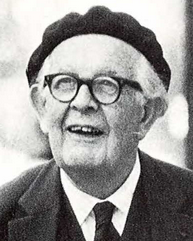
The many-worlds interpretation (MWI) is a philosophical position about how the mathematics used in quantum mechanics relates to physical reality. It asserts that the universal wavefunction is objectively real, and that there is no wave function collapse. This implies that all possible outcomes of quantum measurements are physically realized in some "world" or universe. In contrast to some other interpretations, the evolution of reality as a whole in MWI is rigidly deterministic and local. Many-worlds is also called the relative state formulation or the Everett interpretation, after physicist Hugh Everett, who first proposed it in 1957. Bryce DeWitt popularized the formulation and named it many-worlds in the 1970s.
Educational psychology is the branch of psychology concerned with the scientific study of human learning. The study of learning processes, from both cognitive and behavioral perspectives, allows researchers to understand individual differences in intelligence, cognitive development, affect, motivation, self-regulation, and self-concept, as well as their role in learning. The field of educational psychology relies heavily on quantitative methods, including testing and measurement, to enhance educational activities related to instructional design, classroom management, and assessment, which serve to facilitate learning processes in various educational settings across the lifespan.

A thought experiment is a hypothetical situation in which a hypothesis, theory, or principle is laid out for the purpose of thinking through its consequences. The concept is also referred to as a Gedankenexperiment within the work of Ernst Mach and includes thoughts about what may have occurred if a different course of action were taken as opposed to what did in fact occur. The importance of this ability is that it allows us to imagine what may occur in the future, as well as the implication of alternate courses of action.

Wigner's friend is a thought experiment in theoretical quantum physics, first published by the Hungarian-American physicist Eugene Wigner in 1961, and further developed by David Deutsch in 1985. The scenario involves an indirect observation of a quantum measurement: An observer observes another observer who performs a quantum measurement on a physical system. The two observers then formulate a statement about the physical system's state after the measurement according to the laws of quantum theory. In the Copenhagen interpretation, the resulting statements of the two observers contradict each other. This reflects a seeming incompatibility of two laws in the Copenhagen interpretation: the deterministic and continuous time evolution of the state of a closed system and the nondeterministic, discontinuous collapse of the state of a system upon measurement. Wigner's friend is therefore directly linked to the measurement problem in quantum mechanics with its famous Schrödinger's cat paradox.

Jean William Fritz Piaget was a Swiss psychologist known for his work on child development. Piaget's theory of cognitive development and epistemological view are together called genetic epistemology.
Artificial consciousness (AC), also known as machine consciousness (MC), synthetic consciousness or digital consciousness, is the consciousness hypothesized to be possible in artificial intelligence. It is also the corresponding field of study, which draws insights from philosophy of mind, philosophy of artificial intelligence, cognitive science and neuroscience. The same terminology can be used with the term "sentience" instead of "consciousness" when specifically designating phenomenal consciousness.

An image schema is a recurring structure within our cognitive processes which establishes patterns of understanding and reasoning. As an understudy to embodied cognition, image schemas are formed from our bodily interactions, from linguistic experience, and from historical context. The term is introduced in Mark Johnson's book The Body in the Mind; in case study 2 of George Lakoff's Women, Fire and Dangerous Things: and further explained by Todd Oakley in The Oxford handbook of cognitive linguistics; by Rudolf Arnheim in Visual Thinking; by the collection From Perception to Meaning: Image Schemas in Cognitive Linguistics edited by Beate Hampe and Joseph E. Grady.

Constructivism is a theory in education which posits that individuals or learners do not acquire knowledge and understanding by passively perceiving it within a direct process of knowledge transmission, rather they construct new understandings and knowledge through experience and social discourse, integrating new information with what they already know. For children, this includes knowledge gained prior to entering school. It is associated with various philosophical positions, particularly in epistemology as well as ontology, politics, and ethics. The origin of the theory is also linked to Swiss developmental psychologist Jean Piaget's theory of cognitive development.

Piaget's theory of cognitive development, or his genetic epistemology, is a comprehensive theory about the nature and development of human intelligence. It was originated by the Swiss developmental psychologist Jean Piaget (1896–1980). The theory deals with the nature of knowledge itself and how humans gradually come to acquire, construct, and use it. Piaget's theory is mainly known as a developmental stage theory.
Cognitive development is a field of study in neuroscience and psychology focusing on a child's development in terms of information processing, conceptual resources, perceptual skill, language learning, and other aspects of the developed adult brain and cognitive psychology. Qualitative differences between how a child processes their waking experience and how an adult processes their waking experience are acknowledged. Cognitive development is defined as the emergence of the ability to consciously cognize, understand, and articulate their understanding in adult terms. Cognitive development is how a person perceives, thinks, and gains understanding of their world through the relations of genetic and learning factors. There are four stages to cognitive information development. They are, reasoning, intelligence, language, and memory. These stages start when the baby is about 18 months old, they play with toys, listen to their parents speak, they watch TV, anything that catches their attention helps build their cognitive development.
Predictive learning is a machine learning technique where an artificial intelligence model is fed new data to develop an understanding of its environment, capabilities, and limitations. The fields of neuroscience, business, robotics, computer vision, and other fields employ this technique extensively. This concept was developed and expanded by French computer scientist Yann LeCun in 1988 during his career at Bell Labs, where he trained models to detect handwriting so that financial companies could automate check processing.
The philosophy of artificial intelligence is a branch of the philosophy of mind and the philosophy of computer science that explores artificial intelligence and its implications for knowledge and understanding of intelligence, ethics, consciousness, epistemology, and free will. Furthermore, the technology is concerned with the creation of artificial animals or artificial people so the discipline is of considerable interest to philosophers. These factors contributed to the emergence of the philosophy of artificial intelligence.
Evolutionary educational psychology is the study of the relation between inherent folk knowledge and abilities and accompanying inferential and attributional biases as these influence academic learning in evolutionarily novel cultural contexts, such as schools and the industrial workplace. The fundamental premises and principles of this discipline are presented below.
In psychology, constructivism refers to many schools of thought that, though extraordinarily different in their techniques, are all connected by a common critique of previous standard approaches, and by shared assumptions about the active constructive nature of human knowledge. In particular, the critique is aimed at the "associationist" postulate of empiricism, "by which the mind is conceived as a passive system that gathers its contents from its environment and, through the act of knowing, produces a copy of the order of reality".
Domain-general learning theories of development suggest that humans are born with mechanisms in the brain that exist to support and guide learning on a broad level, regardless of the type of information being learned. Domain-general learning theories also recognize that although learning different types of new information may be processed in the same way and in the same areas of the brain, different domains also function interdependently. Because these generalized domains work together, skills developed from one learned activity may translate into benefits with skills not yet learned. Another facet of domain-general learning theories is that knowledge within domains is cumulative, and builds under these domains over time to contribute to our greater knowledge structure. Psychologists whose theories align with domain-general framework include developmental psychologist Jean Piaget, who theorized that people develop a global knowledge structure which contains cohesive, whole knowledge internalized from experience, and psychologist Charles Spearman, whose work led to a theory on the existence of a single factor accounting for all general cognitive ability.
The LIDA cognitive architecture is an integrated artificial cognitive system that attempts to model a broad spectrum of cognition in biological systems, from low-level perception/action to high-level reasoning. Developed primarily by Stan Franklin and colleagues at the University of Memphis, the LIDA architecture is empirically grounded in cognitive science and cognitive neuroscience. In addition to providing hypotheses to guide further research, the architecture can support control structures for software agents and robots. Providing plausible explanations for many cognitive processes, the LIDA conceptual model is also intended as a tool with which to think about how minds work.
Neo-Piagetian theories of cognitive development criticize and build upon Jean Piaget's theory of cognitive development.
An index list of articles about the philosophy of science.
Quantum cognition is an emerging field which applies the mathematical formalism of quantum theory to model cognitive phenomena such as information processing by the human brain, language, decision making, human memory, concepts and conceptual reasoning, human judgment, and perception. The field clearly distinguishes itself from the quantum mind as it is not reliant on the hypothesis that there is something micro-physical quantum-mechanical about the brain. Quantum cognition is based on the quantum-like paradigm or generalized quantum paradigm or quantum structure paradigm that information processing by complex systems such as the brain, taking into account contextual dependence of information and probabilistic reasoning, can be mathematically described in the framework of quantum information and quantum probability theory.

Juan Pascual-Leone is a developmental psychologist and founder of the neo-Piagetian approach to cognitive development. He introduced this term into the literature and put forward key predictions about developmental growth of mental attention and working memory.







